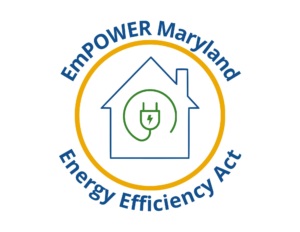Emily Scarr
State Director, Maryland PIRG; Director, Stop Toxic PFAS Campaign, PIRG
State Director, Maryland PIRG; Director, Stop Toxic PFAS Campaign, PIRG

Photo by staff | Used by permission
ANNAPOLIS – On the day after the Maryland Senate’s bill introduction deadline, a broad coalition of environmental, faith, consumer and public health groups expressed disappointment at the Senate’s failure to introduce legislation to update and improve EmPOWER Maryland, the state’s energy efficiency program.
In 2023, the House of Delegates passed a bill to align the program with the state’s energy goals; enable consumers to access new incentives for clean, efficient heating and cooling; and reduce the cost of the program for ratepayers by rightsizing utility profits. The Senate did not have time to vote on the measure before the end of session.
“The House made clear their intention to deliver cost savings and pollution reduction to Marylanders by passing a strong energy efficiency bill in 2023. We hoped the State Senate would show up on day one with their plan,” said Emily Scarr, Director of Maryland PIRG. “We’re disappointed the Senate has not introduced a bill, but we will continue to work with all stakeholders and are determined to send a strong bill to Gov. Moore this session.”
The House bill (HB864), introduced by Del. Brian Crosby, vice chair of the House Economic Matters Committee, makes updates to the state’s EmPOWER Maryland energy efficiency program by requiring utilities to meet annual goals for greenhouse gas emissions reductions and codifies critical consumer protections to reduce rate hikes and ensure the program’s focus remains on in-home energy efficiency benefits. The legislation:
EmPOWER has delivered important benefits to Marylanders since its creation in 2008. It has saved ratepayers more than $4 billion on energy bills and reduced Maryland’s greenhouse gas emissions by the equivalent of 9.6 million metric tons of carbon dioxide – the equivalent of moving 2 million cars off the road for a year.
“Too many families across Maryland are trapped in unhealthy homes that suffer from extreme heat and extreme cold with old, inefficient, costly appliances and heating systems,” said Ruth Ann Norton, President and CEO of the Green & Healthy Homes Initiative. “With smart improvements, EmPOWER Maryland can help deliver much needed improvements to these Maryland families, reducing our reliance on polluting fossil fuels, contributing to cleaner indoor air, lessening respiratory illness, and helping low-income Marylanders save money. As part of a commitment to making EmPOWER more equitable, we should work to pass this legislation that aligns investment to help bring down costs for families.”
One key issue that came up in debate on the bill in 2023 on the House floor and Senate Education, Energy and Environment Committee is the financing of the program. While overall the program has been a smart investment for ratepayers, consumer advocates have criticized the level of profit the utilities have received from the program.
The financing model for EmPOWER in place through 2023 has raised the costs for ratepayers over time without maximizing energy savings. Maryland PIRG Foundation’s 2023 report, Energy Efficiency for Everyone: How to Supercharge EmPOWER Maryland, found that utilities have charged consumers significantly higher rates than utilities in other top states for efficiency programs, driving up costs to ratepayers.
“A large and diverse coalition has come together to ensure Maryland’s energy efficiency program is helping families improve their homes’ energy performance, lower their energy costs, and shift to clean heat and efficient electricity use,” said Josh Tulkin, Director of the Maryland Sierra Club. “Reforming the EmPOWER program is essential to meet our state’s critical climate goals and will benefit Marylanders by bringing down their energy usage and bills. We have heard the Senate is committed to this reform, but it raises a level of concern if the Senate is not introducing a bill. We implore the Senate to act and look forward to continuing to work on EmPOWER reform.”
###
The coalition to support EmPOWER Maryland Energy Efficiency reform includes more than 40 consumer, environment, and faith groups working together to align Maryland’s energy efficiency program with state climate goals and protect ratepayers from unnecessary costs.
350MoCo + Action in Montgomery + Advance Maryland + Audubon Mid-Atlantic + Baltimore Jewish Council + CASA + Cedar Lane Unitarian Universalist Environmental Justice Ministry + Center for Progressive Reform + Chesapeake Climate Action Network + Chesapeake Physicians for Social Responsibility + Citizen Climate Lobby + Climate Reality Project + Economic Action Maryland + Elders Climate Action + Environment Maryland + Green and Healthy Homes Initiative + Howard County Climate Action + Indivisible HoCoMD + Interfaith Partners for the Chesapeake + Interfaith Power & Light (DC.MD.NoVA) + Jewish Community Relations Council/Jewish Federation of Howard County MD + Justice & Witness Action Network — MD (Central Atlantic Conference, UCC) + League of Women Voters of Maryland + Maryland Catholics for Our Common Home + Maryland Energy Affordability Coalition (MEAC) + Maryland Legislative Coalition + Maryland Legislative Coalition – Climate Justice Wing + Maryland PIRG + Montgomery County Faith Alliance for Climate Solutions + National Aquarium + National Housing Trust + People Acting Together in Howard + Potomac Riverkeeper Network + Progressive Maryland + Rebuild Maryland Coalition + Sierra Club Maryland Chapter + Sunrun + The Nature Conservancy + Third Act + Unitarian Universalist Legislative Ministry of Maryland + Waterkeepers Chesapeake